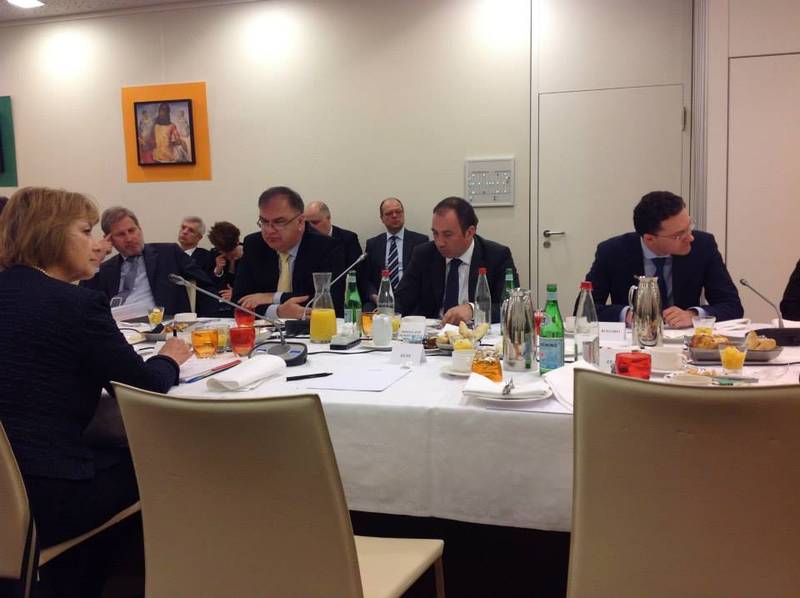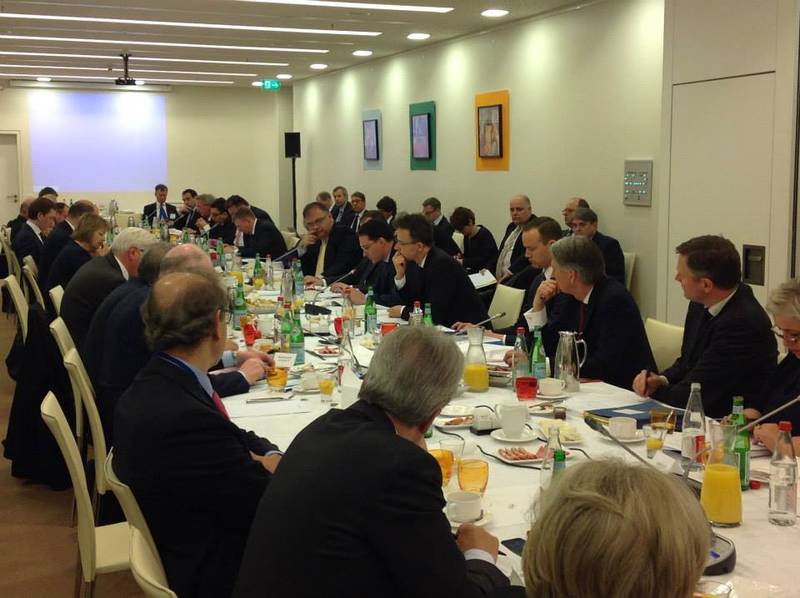EU Is Unfreezing the SAA with Bosnia and Herzegovina
Adelina Marini, April 20, 2015
 EU foreign and European affairs ministers will formally unfreeze tomorrow (21 April) the Stabilisation and Association Agreement (SAA) with Bosnia and Herzegovina in implementation of their part of the deal to change the approach for the country's European integration. This is what Croatia's first Deputy Prime Minister and Minister of Foreign and European Affairs Vesna Pusic said after the working breakfast of Friends of Bosnia and Herzegovina. The breakfast took place before the beginning of the foreign affairs council in Luxembourg on 20 April and for the first time gathered together so many ministers - more than 20. This was the first breakfast dedicated on a Western Balkan country. According to Croatia, which initiated the meeting, it is a sign that the British-German initiative for changing the approach toward BiH is now entirely a European one.
EU foreign and European affairs ministers will formally unfreeze tomorrow (21 April) the Stabilisation and Association Agreement (SAA) with Bosnia and Herzegovina in implementation of their part of the deal to change the approach for the country's European integration. This is what Croatia's first Deputy Prime Minister and Minister of Foreign and European Affairs Vesna Pusic said after the working breakfast of Friends of Bosnia and Herzegovina. The breakfast took place before the beginning of the foreign affairs council in Luxembourg on 20 April and for the first time gathered together so many ministers - more than 20. This was the first breakfast dedicated on a Western Balkan country. According to Croatia, which initiated the meeting, it is a sign that the British-German initiative for changing the approach toward BiH is now entirely a European one.
Ms Vesna Pusic underscored that during the breakfast the European perspective of BiH was reaffirmed, which is very important at a time of strong reserves for enlargement. Although all member states are behind BiH and its European path the mood at the breakfast was of cautious optimism, Vesna Pusic said. The main topics the ministers discussed are the financial package for the country under the compact for growth and jobs in a combination with reforms. The other issue was the mechanism for coordination of the European reforms for which the EU has been insisting for years and has not yet been created. Last week Vesna Pusic was in Sarajevo on an official visit. After the meeting the Bosnian foreign minister, Igor Crnadak, said that the main priorities of the new government are two - the quick creation of this mechanism for coordination and the fight against corruption.
On the question by journalists in Sarajevo regarding BiH's state structure Vesna Pusic said that this is an internal issue for BiH. She recalled, however, that according to the new European approach, the issue of the structure of the country is left for a later stage. The issues that can relatively quickly deliver positive results should be tackled first because they can create the right conditions to discuss any future structure. Such issues are the economic and social problems of the country which were the initial reason for the change of approach for BiH. The question about BiH's structure is a major priority of the biggest  opposition party in Croatia, the Croatian Democratic Union (HDZ), which is a potential winner of the parliamentary elections later this year.
opposition party in Croatia, the Croatian Democratic Union (HDZ), which is a potential winner of the parliamentary elections later this year.
The party is of the opinion that the Dayton peace agreement, part of which is BiH's Constitution, must be renegotiated to enable the creation of a federal state of three equal peoples - Croats, Serbs and Bosniaks (Bosnian Muslims), as euinside recently wrote. First Deputy Prime Minister Vesna Pusic agreed in an interview for the Bosnian edition of the Croatian daily Vecernji list that Dayton has indeed proved not to be the best solution for the functioning of BiH. The country needs a new paradigm and that is its path toward the EU. Equality should not be sought in the Dayton model but in the EU model. The main responsibility about the functioning of the state lies with the BiH politicians, she added.
 Bakir Izetbegovic, Andrej Plenkovic | © Council of the EU
Bakir Izetbegovic, Andrej Plenkovic | © Council of the EU Aleksandar Vucic, Recep Tayyip Erdogan | © Serbian Presidency
Aleksandar Vucic, Recep Tayyip Erdogan | © Serbian Presidency Jean-Claude Juncker, Zoran Zaev | © European Commission
Jean-Claude Juncker, Zoran Zaev | © European Commission